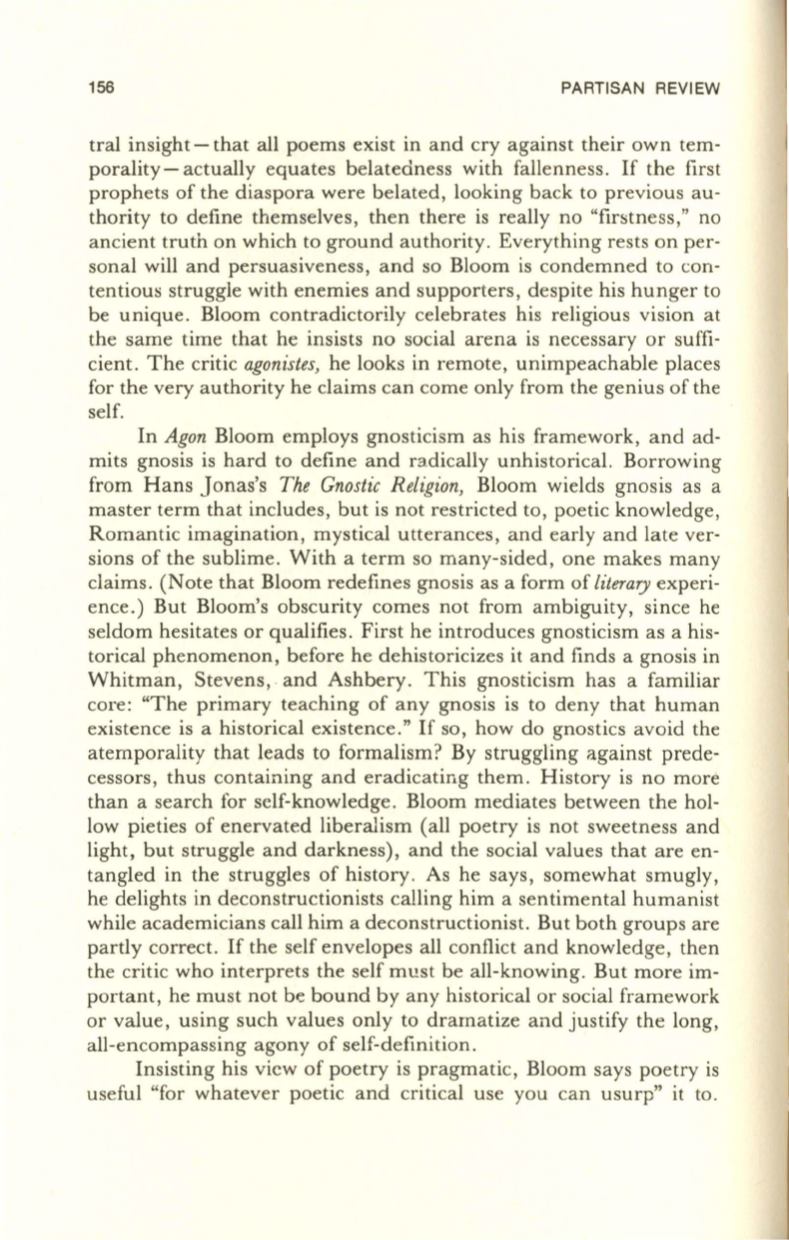
156
PARTISAN REVIEW
tral insight - that all poems exist in and cry against their own tem–
porality- actually equates belatedness with fallenness.
If
the first
prophets of the diaspora were belated, looking back to previous au–
thority to define themselves, then there is really no "firstness," no
ancient truth on which to ground authority. Everything rests on per–
sonal will and persuasiveness, and so Bloom is condemned to con–
tentious struggle with enemies and supporters, despite his hunger to
be unique. Bloom contradictorily celebrates his religious vision at
the same time that he insists no social arena is necessary or suffi–
cient . The critic
agonistes,
he looks in remote, unimpeachable places
for the very authority he claims can come only from the genius of the
self.
In
Agon
Bloom employs gnosticism as his framework, and ad–
mits gnosis is hard to define and radically unhistorical. Borrowing
from Hans Jonas's
The Gnostic R eligion,
Bloom wields gnosis as a
master term that includes, but is not restricted to, poetic knowledge,
Romantic imagination, mystical utterances, and early and late ver–
sions of the sublime . With a term so many-sided, one makes many
claims. (Note that Bloom redefines gnosis as a form of
literary
experi–
ence.) But Bloom's obscurity comes not from ambiguity, since he
seldom hesitates or qualifies. First he introduces gnosticism as a his–
torical phenomenon, before he dehistoricizes it and finds a gnosis in
Whitman, Stevens, . and Ashbery. This gnosticism has a familiar
core: "The primary teaching of any gnosis is to deny that human
existence is a historical existence. "
If
so, how do gnostics avoid the
atemporality that leads to formalism? By struggling against prede–
cessors , thus containing and eradicating them. History is no more
than a search for self-knowledge. Bloom mediates between the hol–
low pieties of enervated liberalism (all poetry is not sweetness and
light, but struggle and darkness), and the social values that are en–
tangled in the struggles of history. As he says, somewhat smugly,
he delights in deconstructionists calling him a sentimental humanist
while academicians call him a deconstructionist. But both groups are
partly correct.
If
the self envelopes all conflict and knowledge, then
the critic who interprets the self
must
be all-knowing. But more im–
portant, he must not be bound by any historical or social framework
or value, using such values only to dramatize and justify the long,
all-encompassing agony of self-definition.
Insisting his view of poetry is pragmatic, Bloom says poetry is
useful "for whatever poetic and critical use you can usurp" it to .


